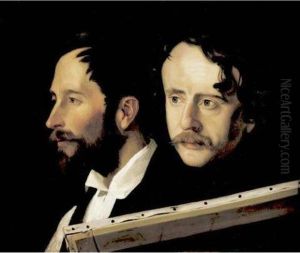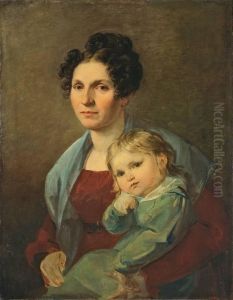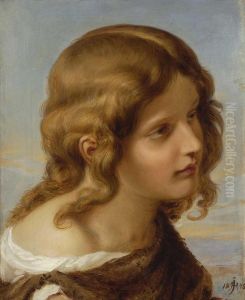Rudolf Julius Benno Hubner Paintings
Rudolf Julius Benno Hubner, born on January 27, 1806, in Oels, Silesia (now Oleśnica, Poland), was a distinguished German painter and printmaker associated with the Nazarene movement. This movement was a group of early 19th-century German Romantic painters who aimed to revive honesty and spirituality in Christian art. Hubner's works are characterized by their detailed execution, religious themes, and the use of historical and mythological subjects. He received his initial art education at the Prague Academy and later furthered his studies at the Vienna Academy, where he was significantly influenced by the works of Peter von Cornelius, one of the leading figures of the German Romanticism and Nazarene movement.
Hubner moved to Rome in 1829, which was a pivotal point in his career. There, he became an integral part of the Nazarene movement, aligning himself with artists who shared his vision of reviving the spiritual depth and sincerity found in the art of the Renaissance and early Christian period. During his time in Rome, Hubner produced some of his most significant works, which were lauded for their devotion to historical accuracy, attention to detail, and emotional depth. His paintings from this period often depicted scenes from the Bible, classical mythology, and early Christian history, reflecting his deep interest in subjects that embody moral and spiritual values.
In 1839, Hubner returned to Germany, where he was appointed a professor at the Dresden Academy of Fine Arts. His influence extended beyond his own works, as he played a crucial role in shaping the next generation of German artists. Hubner's commitment to teaching and his profound impact on the Dresden art scene cemented his status as a key figure in 19th-century German art. Throughout his career, Hubner received numerous commissions for public and religious art, including altarpieces, murals, and portraits. His style evolved over the years, but he remained true to the principles of the Nazarene movement, emphasizing the importance of spiritual and moral integrity in art.
Rudolf Julius Benno Hubner passed away on November 7, 1882, in Loschwitz, near Dresden. His legacy lives on through his contributions to the German Romantic movement and the Nazarene movement, as well as through his influence on the artists he taught and mentored. Today, Hubner's works are held in high esteem and can be found in museums and collections throughout Germany and beyond, serving as a testament to his skill, vision, and dedication to art that transcends the mere visual to touch upon the profound and eternal.


